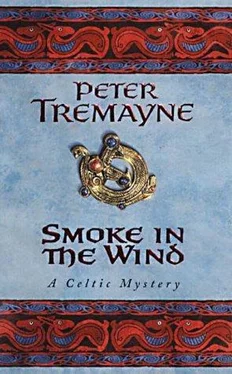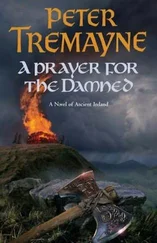Peter Tremayne - Smoke in the Wind
Здесь есть возможность читать онлайн «Peter Tremayne - Smoke in the Wind» весь текст электронной книги совершенно бесплатно (целиком полную версию без сокращений). В некоторых случаях можно слушать аудио, скачать через торрент в формате fb2 и присутствует краткое содержание. Жанр: Исторический детектив, на английском языке. Описание произведения, (предисловие) а так же отзывы посетителей доступны на портале библиотеки ЛибКат.
- Название:Smoke in the Wind
- Автор:
- Жанр:
- Год:неизвестен
- ISBN:нет данных
- Рейтинг книги:5 / 5. Голосов: 1
-
Избранное:Добавить в избранное
- Отзывы:
-
Ваша оценка:
- 100
- 1
- 2
- 3
- 4
- 5
Smoke in the Wind: краткое содержание, описание и аннотация
Предлагаем к чтению аннотацию, описание, краткое содержание или предисловие (зависит от того, что написал сам автор книги «Smoke in the Wind»). Если вы не нашли необходимую информацию о книге — напишите в комментариях, мы постараемся отыскать её.
Smoke in the Wind — читать онлайн бесплатно полную книгу (весь текст) целиком
Ниже представлен текст книги, разбитый по страницам. Система сохранения места последней прочитанной страницы, позволяет с удобством читать онлайн бесплатно книгу «Smoke in the Wind», без необходимости каждый раз заново искать на чём Вы остановились. Поставьте закладку, и сможете в любой момент перейти на страницу, на которой закончили чтение.
Интервал:
Закладка:
When he had gone, Eadulf grinned sheepishly at Fidelma. ‘I am sorry that I have precipitated you into this predicament.’
‘Predicament?’ She paused and shook her head. ‘It is always fascinating to see a new land, even when it is done without intention.’
Eadulf’s features dissolved into a glum expression. ‘The land of the Britons may be fascinating for you but not for me.’
‘What do you mean?’
‘Saxons are not exactly welcome among Britons in spite of Brother Rhodri’s Christian charity.’
‘Do Britons have a reason to dislike Saxons?’
Eadulf glanced at her sharply. Was she mocking him? She was well acquainted with the recent history of these islands.
‘You know that nothing happens without reason, Fidelma. And you know your history as well as anyone I know. You will be aware that the Britons once lived all over this land but two centuries ago the ancestors of my people came from beyond the eastern sea to conquer and colonise — the Jutes, Angles and Saxons. They began to push the Britons westward and northwards and take over their lands. I can understand the feelings of the dispossessed. My people are a warrior people who have only just accepted Christian values. I think, behind their professed acceptance of the new faith, they continue to fear Woden, the old god of war. They still believe that the true way to immortality is to die with a sword in their hand and Woden’s name on their lips. Only along that path do they think they have a chance to pass into the Hall of Heroes, where all the immortals live.’
Fidelma was puzzled at the intensity in his voice. ‘You sound as if you also believe this, Eadulf?’
Eadulf regarded her with a sour expression. ‘I was a young man when I was converted to the new faith by missionaries from Éireann, Fidelma. I went to study it in your lands before I went on to Rome. You know that before my conversion I was the hereditary gerefa of Seaxmund’s Ham. It is hard to forget the culture in which one has been brought up. Within living memory did King Eadbald of Kent revert to the worship of Woden. People are alive today who can remember when the East Saxons killed or chased into exile all Christian missionaries there.’
‘That’s true,’ agreed Fidelma. ‘But most of the Saxon kingdoms are now firmly converted to the Faith.’
Eadulf sighed and shook his head.
‘There are still many kingdoms where the Christian faith is only tolerated. Mercia, for example, is still not entirely Christian. Even with the acceptance of the Faith there has been a constant war between my people and the Britons. Since we carved out our kingdoms with the sword there has always been such warfare. Christian Briton against Christian Saxon. It is also within living memory how Athelfrith of the Saxons defeated the Briton, King Selyf son of Cynan. After that battle, Athelfrith went to the great abbey of the Britons at Bangor and slaughtered one thousand Christian monks to celebrate his victory. Do the Britons forgive us such slaughter, Fidelma? I think not. I cannot rest easy all the while that I am in the kingdom of the Britons.’
Fidelma considered his fears with some sympathy. ‘You are not to blame for the misdeeds of your people, Eadulf. I think that you should reflect on the fact that the Britons are not so narrow-minded that they would blame all Saxons for the events caused by previous generations. The Britons have adhered to the Faith for many centuries, even during the time when the Romans occupied their lands. They do not inflict harm without just cause. The massacre of the monks at Bangor took place in the kingdom of Gwynedd in the north and we are in the kingdom of Dyfed, which is in the south. Dyfed has close links to Éireann. And tomorrow Abbot Tryffin of Dewi Sant has invited us to break bread with him.’
Eadulf looked at her in surprise. ‘We have both been invited?’
Fidelma grimaced. ‘Well, the invitation was primarily to me but it was made clear that if you were sufficiently recovered then you would accompany me. I believe that something is worrying the abbot. He seems a kindly soul. I think that he wants to ask for help but did not feel comfortable about doing so at our meeting this afternoon.’
Eadulf was bewildered. ‘Why would the Britons ask for your aid?’
‘As I said, there are close links between Dyfed and Éireann.’
‘Such as?’ Eadulf, always keen to learn some new knowledge, asked her to explain.
Brother Rhodri entered at that moment bearing a tray with bowls of steaming broth and bread. He set it down on a table beside the bed.
Eadulf regarded the broth wryly. ‘I could eat a side of venison,’ he sighed, glancing at Fidelma, still speaking in their common tongue.
Brother Rhodri regarded him in disapproval. ‘You may try some cuts of cold meat and cheese on the morrow, Brother Saxon, but I would advise you not to fully indulge your appetite for a day or so.’
Eadulf grinned a little in embarrassment at the man, now realising just how fluent the Briton’s knowledge of the language of Éireann was. Perhaps he should have been more circumspect in his utterances.
‘I am grateful both for your nursing and for your advice, Brother Rhodri.’
The round-faced man smiled suddenly. It seemed his natural expression. ‘God never ordained a mouth to be without food,’ he quoted as he left the room. ‘So remember that advice is never the law.’
‘What are these links, Fidelma?’ Eadulf demanded as they began their meal after Brother Rhodri had departed.
Fidelma was nothing loath to explain the history and folklore of her people.
‘According to the old scribes, it was over two centuries ago that a chieftain of the Déisi, Aonghus of the Terrible Spear, made a cast in temper and knocked out the eye of the High King, Cormac Mac Art. Because the cast was an accident, the punishment was not as severe as it might have been. The punishment was that Aonghus and his entire clan were to be banished from their rich lands in the kingdom of Midhe. Part of the clan was settled in my brother’s own kingdom.’
Eadulf nodded, remembering that a tribe called the Déisi did, indeed, dwell in the southern area of Muman. ‘And the others?’
‘Another section of the clan went across the sea. One was led by Eochaid. He settled his people here in this area, which was the lands of the Demetae. He became the ruler here, though it is said that he achieved it by peaceful means and not by war. Since then there have been ten kings of his line and many of the nobles of this place are the actual descendants of the Déisi. That is why you will find many of this kingdom still able to converse in the language of Éireann and why many of our religious come to study here.’
Eadulf had not heard the story before. He considered the history before returning to the main point.
‘If this Abbot Tryffin seeks your help, why do you think he did not say so when you went to see him this afternoon?’
Fidelma paused, a spoon halfway to her mouth. ‘I don’t know. He was cordial and concerned that you were well treated. He asked about our journey and then asked me, and you if you were well enough, to attend him tomorrow at noon.’
‘Why would he seek your help? Indeed, how would he know who you were? I presume he knew that you were a dálaigh ?’
‘A good point to spot, Eadulf,’ she observed appreciatively. ‘He knew precisely who I was and of my qualifications as a dálaigh of the courts. The Britons share a fairly similar legal system with us. Apparently news of who I was reached him soon after our landing. I have told you that many religious from my country come to study at the abbey of Muine.’
‘Muine?’
‘It is what we call Menevia in our language. It is called Moniu in the local language.’
Читать дальшеИнтервал:
Закладка:
Похожие книги на «Smoke in the Wind»
Представляем Вашему вниманию похожие книги на «Smoke in the Wind» списком для выбора. Мы отобрали схожую по названию и смыслу литературу в надежде предоставить читателям больше вариантов отыскать новые, интересные, ещё непрочитанные произведения.
Обсуждение, отзывы о книге «Smoke in the Wind» и просто собственные мнения читателей. Оставьте ваши комментарии, напишите, что Вы думаете о произведении, его смысле или главных героях. Укажите что конкретно понравилось, а что нет, и почему Вы так считаете.












